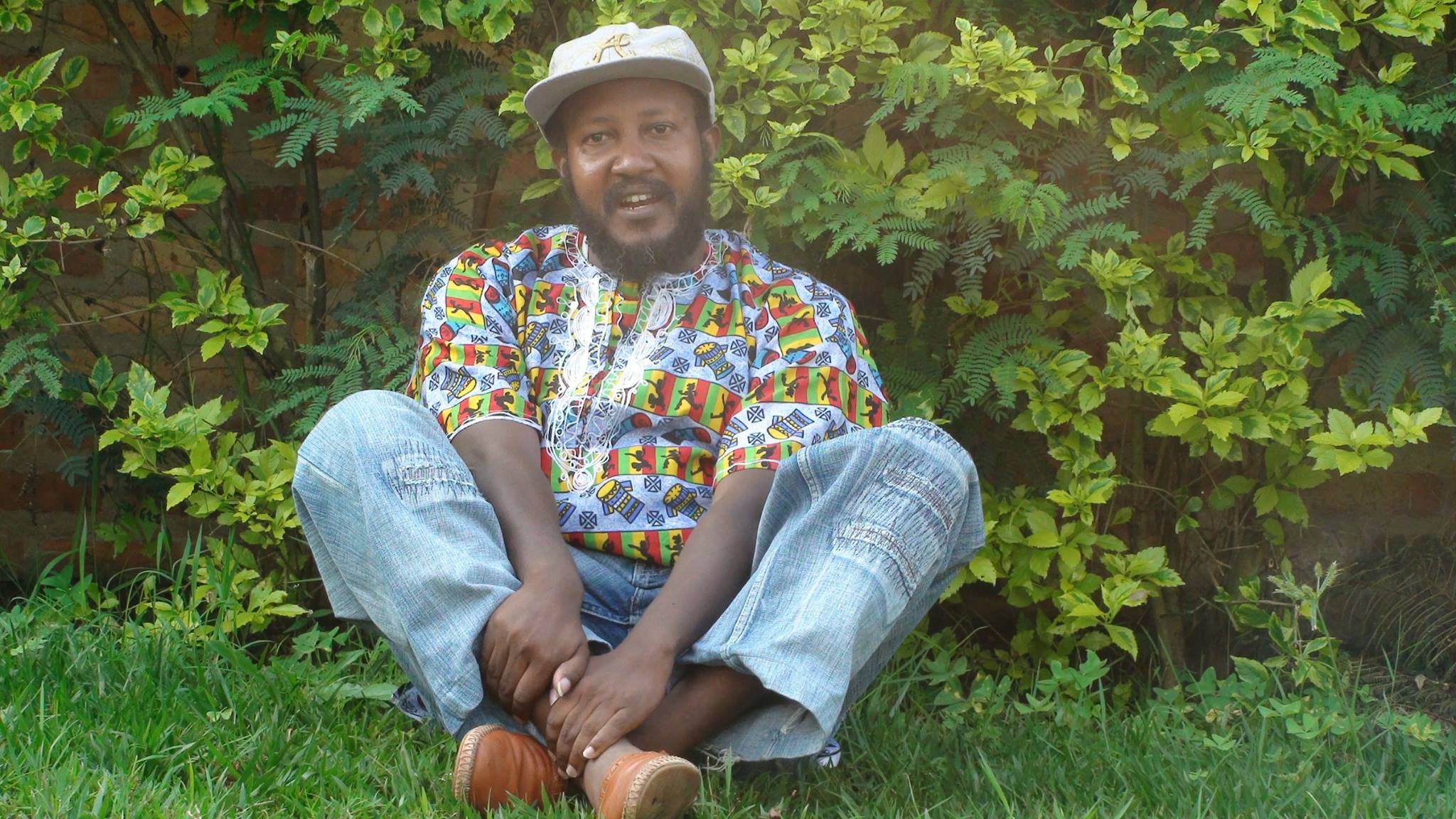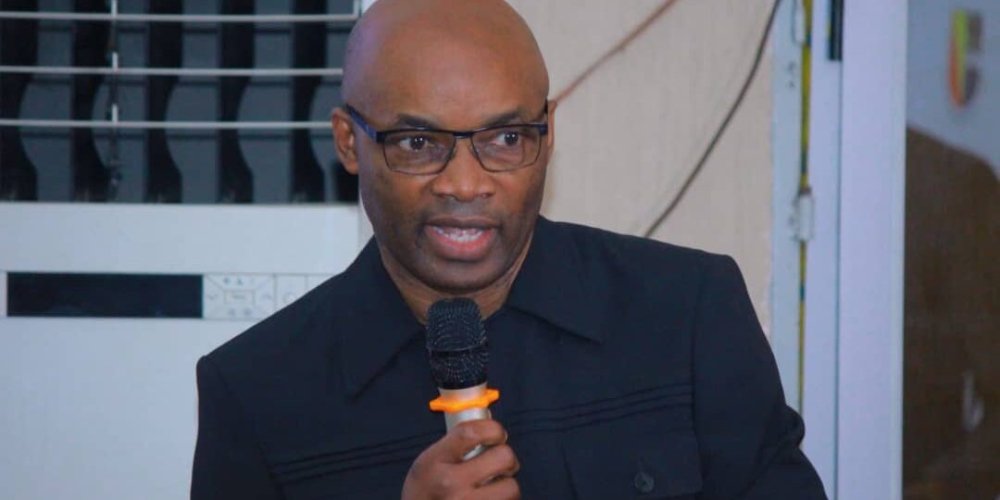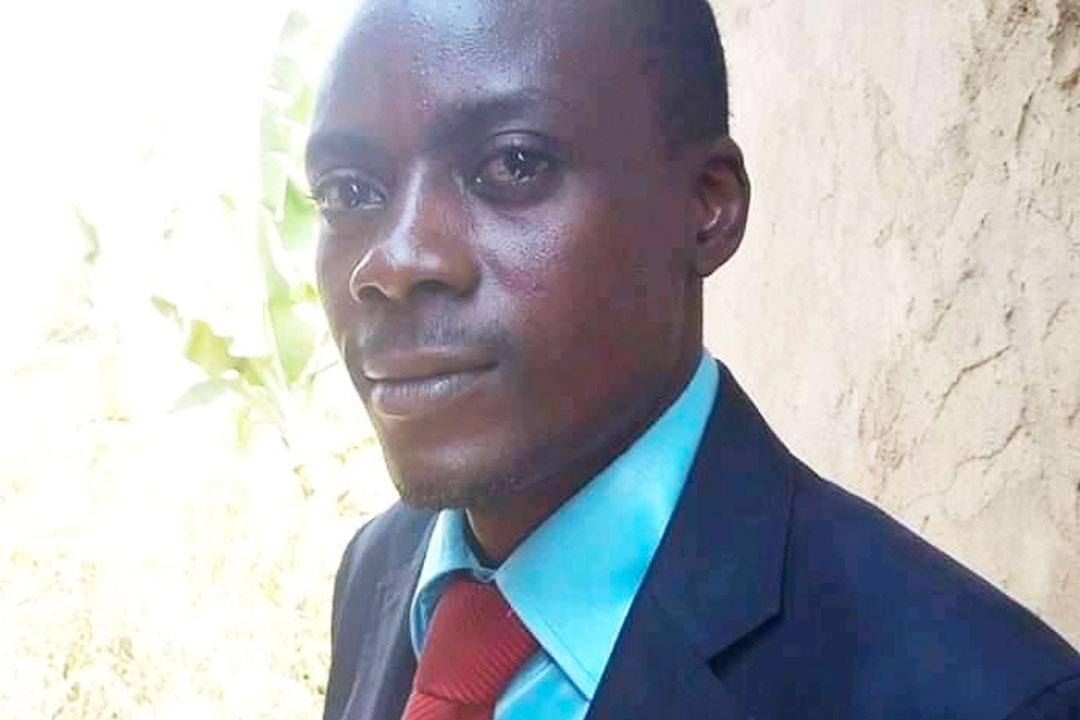Since the beginning of the summer 2019, one name has particularly ignited discussions among Rwandans in and outside the country: Aimable Karasira, a professor of information technology at the University of Rwanda. The forty-year-old lecturer became mostly famous on social media networks, especially on YouTube, where his many interviews accumulated several millions views in just a few months.
In a Rwandan society which is infested with fear, cynicism, deceit, hypocrisy, suspicion, false pretences, unspoken resentments, double speech, individualism, indifference, selective empathy, greed , ethnicity, materialism, jealousy, malice, cowardice; Aimable who once nicknamed himself “Professor Nigga” detonates by his outspokenness, integrity, selflessness and uncompromising analysis of the Rwandan society.
For several weeks, Jambonews has been studying the story of this biblical character-like professor and tried to decipher the coded message from this modern-day prophet.
A family appreciated by the neighborhood
Aimable Karasira Uzaramba was born in 1977 in Mwendo, Rwaniro sector, Rusatira commune, in what was once Butare province and is now Huye district. He is the eldest of a family of four children, Goretti Ingabire, two years younger, Emmanuel Tuyisenge, four years younger and Aimé Uyisenga, the youngest in the family, born in 1990 at the beginning of the war.
His father, Claver Karasira, was an agronomist at the Ministry of Agriculture and mainly worked in the tea factories of Mulindi and Shagasha. “At the ministry, he was known for his integrity and his peaceful nature,” says Joseph, a former colleague at the ministry who is now a refugee in the Netherlands.
Her mother, Goretti Mukaruzamba, was a primary school teacher in Ruhashya, before working at the Caisse d’Epargne du Rwanda. “It was a well-off family, much appreciated by the neighborhood, with whom my family and I had excellent relationships,” continues Joseph.
1990: Return of ethnic ghosts
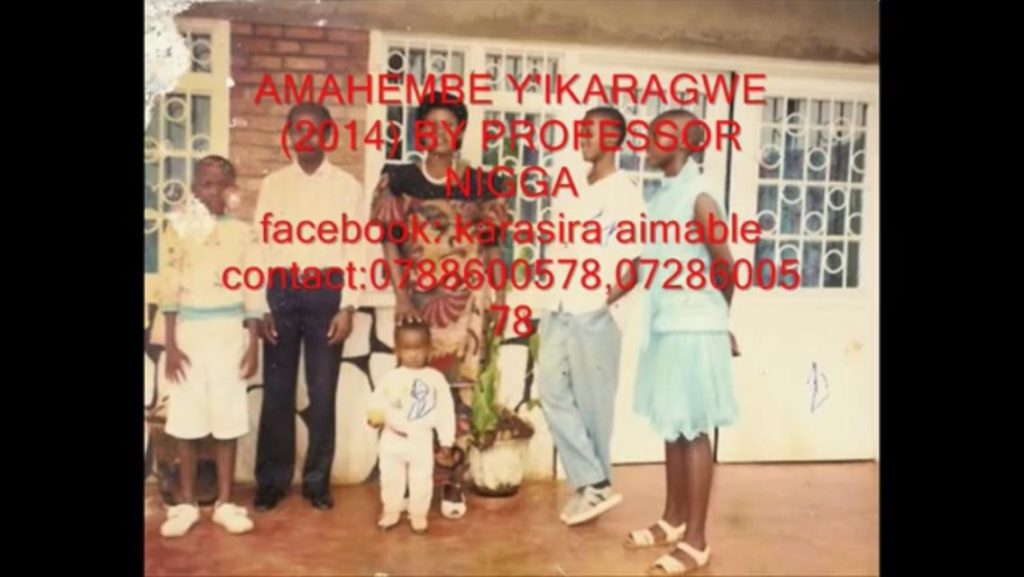
On October 1st1990, the Rwandan Patriotic Front (RPF), a political-military movement composed mainly of Tutsi exiles in Uganda, attacked Rwanda under the leadership of General Fred Rwigema, a Rwandan refugee who had became an officer in the Ugandan army.
Ethnic ghosts resurface almost immediately in Rwanda, as only a few days after the attack, on October 5, 1990, a wave of arrests affected nearly 10,000 Rwandans suspected of being “ibyitso” (spies), and among them many Tutsi.
Mistrust among the population was gradually building and the Karasira family, who’s both parents are Tutsi and who had meantime moved to Gitega, was quickly to pay the price. “Although the family had no connection with the RPF, tensions began to arise with neighbors and derogatory accusations of connivance with the assailants began to be made. One day, neighbors armed with machetes landed in their plot, it was a very large plot containing many fruit trees. The assailants cut down all the fruit trees to prevent “Inyenzi” from hiding in them,” says Ernest, a former classmate of Aimable Karasira, to whom he liked to confide about his life during their last two years of high school at Rugunga High School in Kigali
“That experience was traumatic for the family, and that was the reason they moved to Nyamirambo, a few hundred metres from the stadium, near Bernard Makuza’s residence, where they felt safer,” Ernest adds.
1994: The apocalypse
April 1994: terror
On August 4, 1993, after 3 years of a deadly civil war, the delegation of the then government, led by President Juvenal Habyarimana, and that of the Rwandan Patriotic Front, led by Alexis Kanyarengwe, signed a Peace Agreement in the city of Arusha in Tanzania.
On April 6, 1994, when Rwandans thought a peaceful resolution of the long deadly conflict was insight, President Habyarimana’s plane was shot down while it was landing in Kigali and Rwanda immediately turned into horror.
Just hours after the attack, soldiers of the Habyarimana regime disembarked at the Karasira family’s home, shot at the front door, broke windows and after a cursory search of the house, they immediately left. “For the next few days, Aimable and his family lived in their family home, some hidden in the cypress trees of the house, others in the corridors, in fear for the return of the soldiers that could be fatal to them,” Ernest told us.
May 1994: the RPF shell
Despite the fear and risk of being killed at any time, the family remained unharmed until May 21, 1994. “It was on that day that the horror reached Aimable’s family when a shell fired by the RPF (Katiyusha) fell on their house. Emmanuel, who was 13 years old at the time, had his legs cut off at the time, and died a few hours later,” Ernest adds.
The family then decided to disperse to increase the chances of survival of some family members. While Aimable remained at home with his father, his mother, little brother and sister headed to Butare in southern Rwanda, their region of origin.
“They never arrived in Butare and stayed in Gatagara after learning that everyone in his father’s home village had been massacred by the Interahamwe,” Ernest explains.
Shortly afterwards, the Inkotanyi took control of the area and the population was forced to regroup in IDP camps in Bugesera and Aimable’s family went to Rilima. “There was a large camp for internally displaced people and since her mother spoke French, she was hired as a volunteer with Médecins sans Frontières to ensure contact with the displaced,” Ernest continues.
August 1994: “My family was taken away in a way that cannot be told”
In August 1994, days after the RPF took power, part of the Karasira family was reunited at the family home in Nyamirambo when his mother and Aimé, the youngest member of the family, returned to find the father and Aimable. “Their little sister had stayed in Rilima to treated of cholera. As she was ill, her mother didn’t want to take the risk of travelling with her, thinking she was safer in the Rilima camp where she could be taken care of by Médecin Sans Frontières staff who were on site in case her condition worsened,”says Ernest.
An atmosphere of mourning reigns within the home: “Aimable’s entire paternal family was exterminated during the genocide against the Tutsis and on the side of the maternal family, there were not many people left either, whereas Emmanuel was killed by a shell,” Ernest continues.
The latter continues: “Two days after the reunion, seeing that security seemed to have returned to Kigali, his mother returned to Rilima to pick up her daughter Goretti, despite news of massacres against Hutus by the RPF in the region. She thought that as a Tutsi she was safe from these “mass killings” of Hutus, which were committed“in the shadow of the Tutsi genocide.”
His mother would not return home. At the beginning of September 1994, Claver Karasira, the father of the family, decided to go Rilima on the insistent advice of a certain Gatari “Aimable often told me about him. He is very angry with Gatari because he is convinced that he knows the identity of his family’s murderers. I don’t know his middle name, but Aimable described him as someone“known for his lameness,” Ernest recalls.
Not seeing his father returning home, Aimable Karasira, still a teenager at the time, decided to go to the region in the footsteps of his family. “When he arrived in Rilima, near the Médecins Sans Frontières headquarters, he was asked to wait for an “Afande” to arrive, and it was during this time that he learned what had happened to his family. An internally displaced person told him that his mother had been executed by the RPF along with his sister. RPF suspected Aimable’s mother, as a French-speaking person, of having provided information on the massacres committed against the Hutus to Médecins Sans Frontières. Her father who had arrived looking for her had suffered the same fate, and Aimable was invited to leave if he wanted to survive.”
“My little brother was killed by a shell, and the others left in an unclear way, or rather in a way that is clear but cannot be told,” explains Aimable Karasira today.
In his interviews, aware of the sensitivity of the subject and the risks he faces, Karasira rarely gives his analysis of the Rwandan tragedy, often repeating, “It’s politics, I wouldn’t talk about it” andsimply mentioning the role of foreign states in this tragedy that has taken his family away“Foreign countries have had a role in what happened here, France, Uganda and the United States. France because it supported the old regime, the United States because it had the means to stop everything, and Uganda is also involved in a certain way. Its geopolitics, they were pursuing their interests. I can’t hate them 100%, but they used our compatriots to do evil. I hate the Clintons, if Hillary had won the American elections in 2016 I would have been sad.»
The impossible mourning
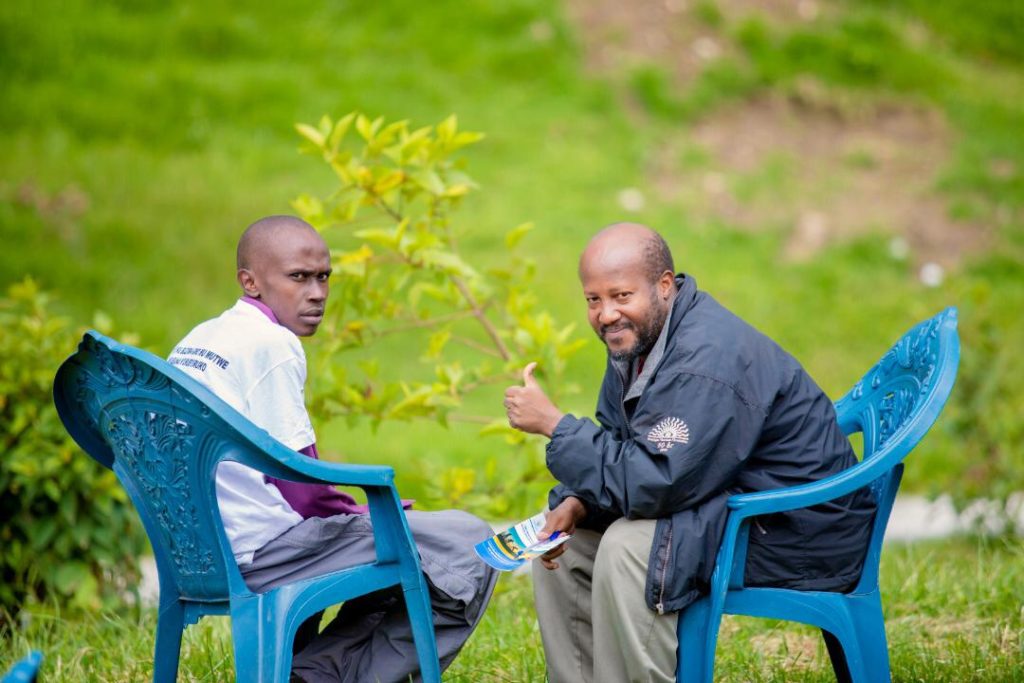
source: Instagram by Aimable Karasira
Since 1994, like the other victims of the RPF, Aimable Karasira has been forced to remain silent about the fate of his family. In addition to the pain of losing his family, there is the burden of an impossible mourning and silence imposed on the circumstances of the disappearance of his family.
While the Tutsi victims of the genocide are supported in their reconstruction by many Rwandan and international associations, as well as by various State bodies such as the Fund for Assistance to Genocide Survivors (FARG), and while the Hutus victims of crimes and acts of genocide committed by the RPF against them, although left to their own devices, they support each other in silence in their pain, Aimable Karasira found himself alone within a society which discriminates against orphans on based on their ethnicity but also on the basis of their executioners.
In his interview with the VOA in September 2019, Aimable Karasira recounted this period: “I didn’t know where to turn. Imagine having no one to whom you confide, no one to talk to, everybody rejecting you on the grounds that you don’t share the same pain. »
In a 2015 song, “Ndeka undorere” (“Leave me alone”), Aimable Karasira talks about how he has been “excluded from society” and explains in pictorial language how he was rejected by both Tutsis and Hutus: “Imagine being reduced to a wreck, those sharing your pain having people to speak for them when you have no one to speak for you”. “I don’t know how to explain how I didn’t go crazy.” he adds in his interview with the VOA.
Ernest comments on that particular episode as follows: “Although Aimable is a Tutsi, a victim of the genocide because he lost his entire paternal family in the genocide against the Tutsis, he was not accepted into the associations of genocide survivors, because people knew that his direct family had been killed by the RPF, while the Hutus who survived Tingi Tingi and other massacres committed by the RPF in northern Rwanda were suspicious of him, taking him as a spy.»
“It is his personal story combined with the lack of support in society that has made Aimable a depressed man. Aimé, his younger brother, has lost his mind and now lives in a rehabilitation center where visits are only allowed once a month,”Ernest adds.
In a Rwandan society where depression is seen as a tare, a disease of the weaks or the “whites”, Aimable refuses to be ashamed of being depressed: “Imagine being in a country and having nowhere to go, at the time of the commemorations having no place to commemorate. Losing yours, your father, your mother, no longer having a paternal family, no more maternal family, while you live with some of those responsible of your misfortune. And you’re telling me I can think normally after that? I’m proud to be depressed.»
2009: The Way of the Cross
The years 1994 to 2009 were a real Way of the Cross for Aimable Karasira, “Cigarettes and alcohol were his best friends,” Ernest recalls. Although Karasira is an orphan and Tutsi, he will not be able to benefit from any State aid, particularly from the FARG, as he was not bereaved in a way that allowed his pain to be recognized.
As if this sentence was not enough, Aimable is forced to drink the chalice to the dregs when the immense part of their plot is abusively taken away from them: “Aimable often told me about a certain Patrice Rwanyagatare, who expropriated them along with the Rwandan Patriotic Army, including an officer named Munyaneza,” explains Ernest
In an interview with the media Igihe in July 2019, Karasira described his life at that time as a “Way of the Cross”: “I have no father, I have no mother, but if I met them today, I would ask them why they gave birth to me. I had a family, and almost all my family was taken from me in 1994, I have only one little brother left, who is a drug addict and a burden to me (…) I don’t want a child because that would be to give birth to him in an ocean of problems.”
Despite the passing years, Aimable’s pain is not subsiding, it is only getting worse. Once he arrived at the University of Butare, Aimable repeated to anyone who wanted to hear him, “I would be happy the day I could kill myself“. In another interview, he adds that for him, “coming into this world is worse than punishment, many things that you are not responsible for happen to you“.
When in July 2019, journalist Sabin Murungi of Isimbi TV reminded him of what he used to say at the University and asked him if he still thought the same thing, Aimable’s answer immediately fused: “I have hope that one day they will allow suicide (…) If it were allowed, and if I had the courage because it is not given, and that I was sure not to miss, I would kill myself.”
In the same interview he adds, “I have never celebrated my birthday, if a wizard told me the date of my death, it is rather that date I would celebrate every year.”
2009: The Tuff Gang Glow
In 2009, while Aimable Karasira’s life still looked like an endless dark tunnel, and year after year he still felt lonely in the face of his pain, a glow broke through the darkness with the appearance of the rap group Tuff Gang.
“The story of my life is a succession of problems, heavy problems, very heavy problems, and I thought these problems were impossible to explain and I buried it in me, until I heard about a group of young people called Tuff Gang (…), they were talking about street problems, people in prison, unhappy people,” says Aimable in his interview with The Voice of America.
Like tens of thousands of young Rwandans who feel left to their own devices, Aimable Karasira recognizes himself in the group’s words and vibrates to the rhythm of the words of this local rap group that speaks for this youth forced to silence.
In their most popular song, entitled “Amaganya” (“Lamentations”), which borders on 340,000 views on YouTube, the group evokes the despair of Rwandan youth: “We grew up hearing that the best was yet to come, but the years continue to pass.” The group also talks about the weight of history, “You might think we chose these dark times but it was our history that made us feel that way“, as well as sadness, poverty and hunger, “no peaceful heart, no material goods, nothing in the womb“. As a refrain, the group sings, “We are prisoners of who we are and where we come from, if we don’t talk, it’s not because we have nothing in our heads; in life, every man fights for himself, just know that our hearts are full of lamentations. »
2010: Professor Nigga
Listening to the band’s songs, Aimable feels comforted and inspired: “Even if I couldn’t sing, I said to myself, I’m going to do rap because no one has ever understood my problems and I saw music as a way to heal me, a therapy,” he explains to the VOA.
Thus, under the stage name of Professor Nigga, who has since become famous, Aimable Karasira found a way to lighten his burden, which had become too heavy to bear.
In his first song “Mureke kunyitiranya” (“Stop confusing me with someone else”) released in 2010 Karasira sings “Don’t take me for who I am not because the father you think is not my father;” to denounce the rumors about his family that circulated in order to discredit him when he started teaching at the university.
Some claimed that he was the son of Froduald Karamira, a former Tutsi who became a Hutu according to Rwandan history and was sentenced to death for genocide in 1997, and others claimed that he was the son of Martin Bucyana, the president of the political party CDR, who was lynched in February 1994 by a crowd that accused the party of being at the origin of the murder, the day before, of Félicien Gatabazi, one of the main leaders of the Rwandan opposition at that time.
“They invented my parents when I was a professor at the University (…), in order to discredit me, I don’t want them to love me, I want them to leave me alone,” Aimable Karasira told Ukwezi media in August 2019.
The evil creatures
In 2014, the artist released a song entitled “Amahembe y’i karagwe” (“Evil Creatures”) which is “the consequence of his great depression” and in which he makes his first reference to the gravediggers of his family: “Evil creatures kill those who break the oath, evil creatures kill those who are pointed at, evil creatures are those who have exterminated my family” wondering why he has survived.
To anyone who knows of Rwandan society, the oath mentioned by Karasira reminds us of the RPF’s oath that we take “at the risk of our lives” and under the penalty of being “crucified” if we venture to break it. Especially since just a few months before the song’s release, Paul Kagame had recalled this punishment for the umpteenth time after the murder in South Africa of his former right-hand man who had ventured to break his oath: “Anyone who betrays our cause or wishes harm to our people will become a victim,” General Kagame said at a prayer breakfast.
In the legend of this song “dedicated to his murdered family” the artist writes, “The content of this song explains how I am. When you call me an unmanageable madman, just know that it was evil creatures that made me this way.”
“Leave me alone”
In a 2015 song entitled “Ndeka Undorere” (“Leave me alone”), Aimable Karasira revisits the disappearance of his family and becomes even more precise about the identity of their executioners. “Ours went to a meeting and died“, in reference to a macabre pun famous among the victims of the RPF.
Indeed, in the areas under RPF control and in the Hutu refugee camps in the DRC, civilians were often called to meetings, many of which never returned. This observation had eventually created the legend among certain segments of the population that those who went to an RPF meeting (“Kwitaba inama”) found death there (“Kwitaba Imana”).
As if he were afraid that the listener would miss the message of his song, the artist takes care to specify in English at the end of the video that this is indeed his own story: “This song was written based on the artist’s true story.”
2019 : The prophecy
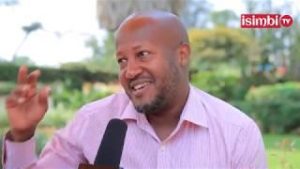
In 2019, after music, Aimable Karasira found a new form of therapy in speech. His interviews quickly create a buzz and he is solicited by a multitude of online media. “People were thirsty for truth,”Karasira explains when asked about the reasons for the success of his interviews, which often contain life lessons that sound like prophecy.
Karasira never refuses an interview, on the same day, he sometimes gives several interviews to different media. “Giving me the microphone is like turning on a tap, I talk very fast because I have a lot on my heart, I have a lot of things that I’ve buried for years and that I needed to express.»
“People can sometimes be surprised or shocked by what I say, but it’s like someone who has to throw up. When you feel nauseous it’s hard to hold back and when you vomit you feel relieved, while the one next to you may find it disgusting. I feel relieved when I express what I have on my heart,” Karasira explains to those who ask what makes him express his truth.
The worst are the indifferent
Although the comments of those who listen to him are often positive, many point out that the themes he addresses are often negative. Karasira explains: “In the Japanese tradition there is the principle of yin and yang, which explains that everything is balanced. There are boys and girls, white and black, light and darkness, but in Rwandan society, as far as good and evil are concerned, there is no longer any balance, evil has triumphed. »
Faced with the situation of distress facing the Rwandan population, Karasira seems to be more angry with the silent majority, the majority that remains indifferent, than with the actors of persecution whom he never ventured to name. “There are bad people who do evil, but the worst are people who don’t tell those who do evil, that they do evil. During the genocide against the Tutsis, there were many people who did not kill anyone but who watched without acting, many of them were convicted for that. »
At times he even gets annoyed with the silence of Rwandans in the face of their own misfortune: “I speak for you and you say that I have lost my mind, it hurts me so much to speak for you and to see you so inert. Maybe I should keep quiet, maybe I should let them continue to oppress you (kubakanda), maybe if they oppress you more you would end up understanding what I was saying.»
“The RPA and I are two.”
Aware that while operating under one of the most repressive dictatorships in the world, the slightest slip of the tongue can cost him his life or freedom, Karasira announces to anyone who wants to listen to him that he will “not talk about politics“. But when, in his most listened interview, a journalist dares to ask him if he supports a football team, Karasira answers, “I don’t support any team but there is one team I hate, it’s the RPA. When the RPA plays and loses, I feel relieved. Even if the RPA played against Lucifer’s team, I would support Lucifer’s team. “Later in the interview he adds:“When the RPA concedes a goal, I feel a joy that I can’t describe, I don’t know where it comes from. »
The interview is a buzz and has quickly exceeded 200,000 views. Although he denies it, many see it as a backdoor way to express his opinion on the Rwandan Patriotic Army (RPA), which has taken his family and bears the same name as the football team it founded.
Karasira’s popularity affects all strata of Rwandan society and several RPA fans, who otherwise appreciate his life lessons, immediately expressed their dissatisfaction on this point in the hundreds of comments following the interview.
A week later, during a new interview, Karasira is invited to react. While one would expect him to take back what he said in order to please everyone, Karasira says in his own style: “We have to accept that we can’t see things the same way, I have neighbors who are vegetarians, who catch hives when they eat meat ,while I like meat. That does not mean that we should be enemies. The RPA and I are two, I can’t play hypocrite and say I’m a fan of the RPA when I’m not. »
And he adds by addressing the fans of the RPA directly: “Rejoice when we talk about RPA, digest RPA but know that I when it comes to the RPA, I get hives, I have allergies“, giving a great lesson of tolerance to a society known to turn people with different political beliefs into enemies.
“I don’t want children, these interviews are the trace I will leave on earth”
While Karasira is over forty years old, he is often asked why he has no wife nor children. “The reason I don’t want love, I don’t want a wife, or children, is the life I see here in Rwanda, in Africa. We are being lied to by saying that the best is yet to come, but I am a teacher and I see where we are heading, I see how taxes are increasing, I see how the population is increasing while food is decreasing (…) I don’t want a child who will constantly wonder what his future will be.»
If Aimable is not worried about the lack of descendants, it is because he is convinced that a man is not remembered for his children but for his actions.
“The legacy I want to leave to Rwanda is my thoughts. In two or three generations, we will realize how useful my words today are (…) I know Rwandans, it will take time, but one day the word will come out and Rwandans will say what they have on their hearts.“he often says.
Sodom & Gomorrah
One of the things that saddens Karasira is the loss of Rwandan society’s values and the fact that young people have taken refuge in drugs, alcohol and are interested in futile things. “Our society is superficial, we imitate capitalism and we have lost all the values of our society. Rwanda is based on farmers, livestock, and tourism, but instead of having YouTube views of a farmer, a distinguished breeder, it is the futile things that attract youth. On the radio it is impossible to hear a program on agriculture or livestock, we only have music and football, while we don’t even have a strong football team. »
As examples, he mentions the incredible success of “Igisupusupu” music and that of Shaddy Boo, a kind of Rwandan Kim Kardashian who is setting new audience records on Instagram.
“I would like God to burn everything, as in Sodom and Gomorrah, for me to be carried away, for everything to be carried away and for us to start over. »
The Pharisees
In the absence of Sodom and Gomorrah, Karasira intends to upset Rwandan society and push it to change by telling it the truths it does not want to hear. “Society considers me to be a strange, funny person, but that doesn’t bother me, it’s the way Jesus was considered by the Pharisees, he told them that they were like well decorated tombs while inside there is nothing. If they could find a way to do it, they would kill me because societies like ours do not like those who tell the truth,” he said in one of his many interviews with Igihe.
The word truth is Karasira’s leitmotif, he mentions it in each of his interviews, especially when he calls on Rwandans to tell the truth and to stop behaving like “Pharisees, hypocrites” if they want to get out of the negative spiral in which the society is mired.
Besides hypocrisy, Karasira denounces the materialism of Rwandan society: “I regret not having been born in Europe. Here, if you are a teacher, our society wants you to have a car, to wear a tie, to wear a suit all the time, because in our society, even if you have nothing to your credit; the society will be impressed, to say that you are the model… I don’t need a tie. “However, he confesses that in the face of his social isolation, he could comply in the years to come, “to please them”.“Jesus was crucified because he refused to comply, he told his truth, he told the Pharisees that they were hypocrites, he told them truths they did not want to hear and when they chose who was to be saved, they chose to save Barabas rather than Jesus. I am learning to become a hypocrite because I don’t want to be a victim like Jesus.”
The meaning of the formula
Beyond his teachings, Karasira is appreciated for his sense of formulating thoughts, for example, when asked about the “Made in Rwanda” advocated and praised by the current Rwandan leaders, Karasira points out their contradictions: “If you talk about Made In Rwanda, make it a reality. Wear clothes made in Rwanda, let your child study in Rwanda, you the leader who talks about it, let your parents take care of themselves in Rwanda’s hospitals. If your family is being treated with the Rwandan population, you will know its problems, but if you promote the Made in Rwanda, if you praise our universities while your children are studying in Scotland, Canada, the USA, my friend, you are not telling the truth. »
Madness is relative
Though his sense of formulating thoughts and his humor are his strong points, his sense of repartee cannot be outdone. Thus, for example, when asked to react to the comments of those who call him “mad”, he explains that the notion of madness is relative – and scratches the Rwandan leaders who get rich on the backs of the population to the point that year after year, the ruling class in Rwanda becomes increasingly richer while the population becomes increasingly poor. “Every person has a degree of madness, if we took all the madmen and brought them to Ndera (a town with a psychiatric asylum), there wouldn’t be many people left. A person who is going to loot the population’s property, who is going to construct buildings with I don’t know how many floors when he will end up in a small grave, is the craziest of all.Are we going to take him to Ndera when he is the one who is taking people there?»
Karasira Family, a second family
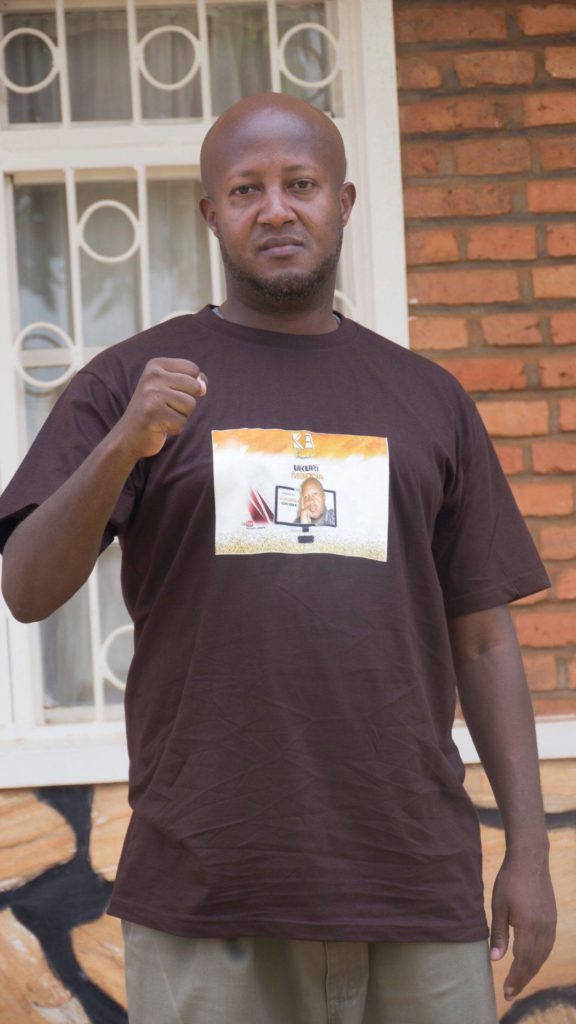
Aimable Karasira was touched by the excitement that his speeches generated among Rwandans, especially by those who had sent him messages to tell him that they appreciated him as an older brother, a son, a friend, a confidant or simply as someone who expressed their concerns.
On July 17, 2019, this enthusiasm prompted Karasira to create a forum in the form of a WhatsApp group bringing together his fans, a discussion space in which everyone has a voice and a right to control the rules that govern them.
In an interview broadcasted a few days after the creation of this group, Aimable Karasira explains “They saw in me the gift of healing hearts (kubohora imitima) and I saw in them the gift of a family that I no longer had. I had remained alone in the world and today I have a big family all over the world.”
In the same interview, he repeated that he did not want to engage in politics and asked the opposition to stop using his name to criticize the regime. He clarified his approach, saying that he was making the “ubuse” (“criticism”), and that in Rwandan history the “abase” (those who criticize) have always existed and their role is to criticize what is wrong in society so that it can be corrected. “The objective of my action is to tell the sick person to go for treatment.»
Karasira Family’s first spontaneous action was to organize a fundraising campaign to finance the creation of Aimable Karasira’s Youtube channel. The latter had expressed a desire to launch his own TV channel to meet the demand of those who wanted to see him more regularly and discuss different topics, and he also wanted # more autonomy and freedom.
His project has now become a reality with the launch of the channel “Ukuri-Mbona” (“My Truth”) through which Karasira speaks for those who have no one to speak for them, such as teachers or teenage girls who get pregnant before being delivered to themselves.
In one of his shows, he visited Verene Nyiraminani, a woman in a wheelchair who had become isolated. Aimable told her story and it touched people who live abroad and they sent her money. In early November 2019, Karasira helped Nyiraminani, who was limited in her movements, to recover her money. Regarding his visit, Aimable explains: “After the interviews in which I talked about the problems I have had in my life, many people approached me and told me that they were now my family. I had uncles, aunts, it was good and I thought, why not take advantage of this enthusiasm and use to help those in need in a concrete way? It was in this context that we visited Nyiraminani. We spoke for her and were able to provide her with concrete help. Everything went really well. »
“I feel happy that the Karasira family visited me and that I was able to explain my problems to them. I had nothing, not even kitchen tools, and they found people to help me. Life was hard, but now I see that it’s changing. (…) Life was very bitter, I was alone, I lived alone, I lived in solitude and when I saw them coming, I felt that I had a family that took care of me, it made me very happy,” says Nyiraminani, the beneficiary of the day’s good deed.
Aimable Karasira, who for many years, when he needed it the most, had no one to speak for him, has now become the voice of Rwanda’s voiceless, even using his notoriety to raise funds for those in need.
Ruhumuza Mbonyumutwa
Jambonews.net

